3D Perspective - Demo 18¶
Objective¶
Implement a perspective projection so that objects further away are smaller than the would be if they were close by
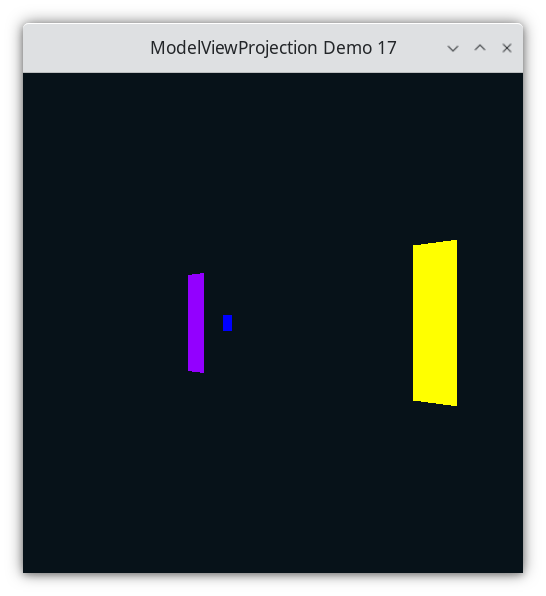
Demo 17¶
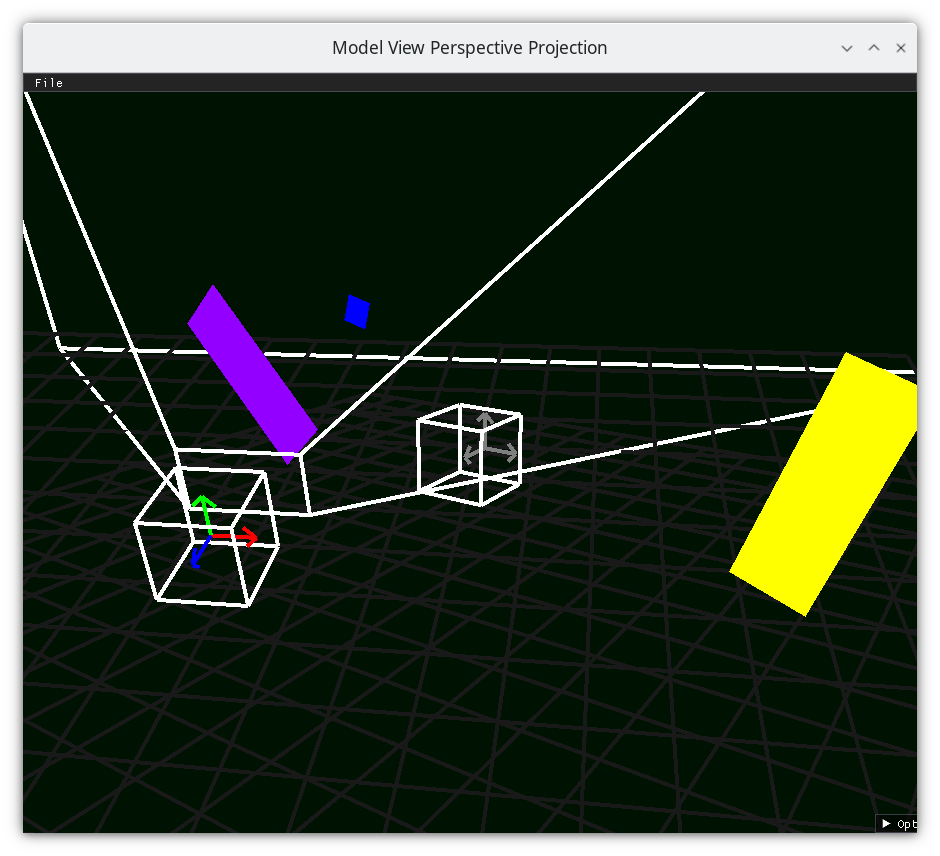
Frustum 1¶
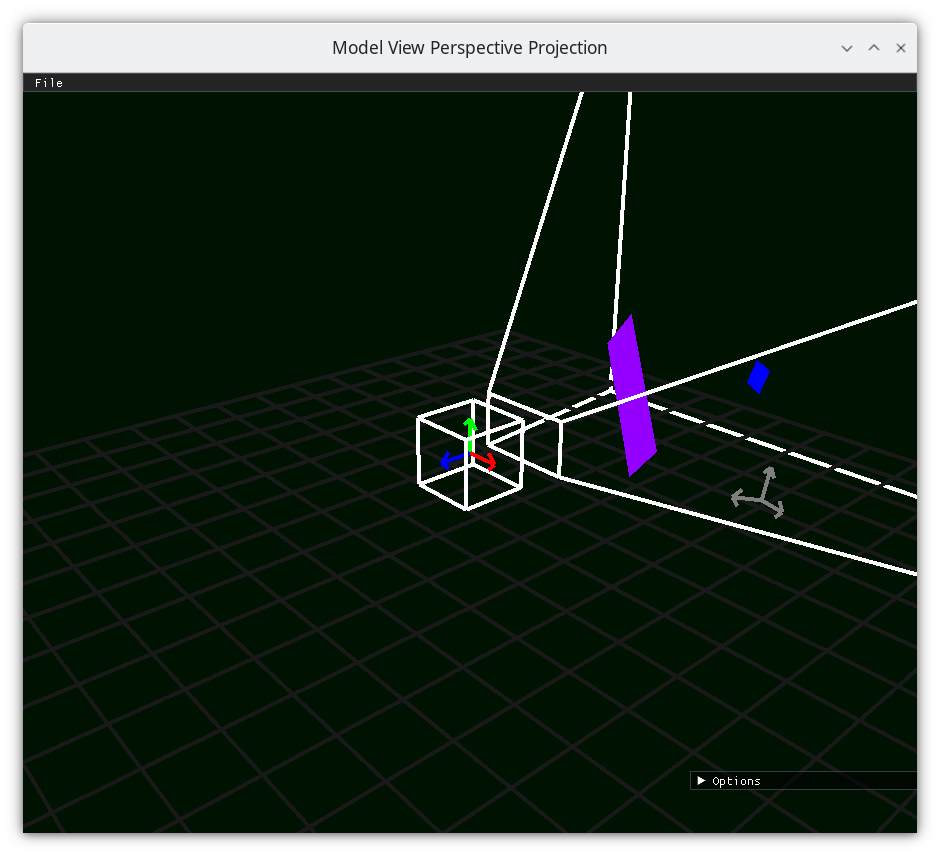
Frustum 2¶
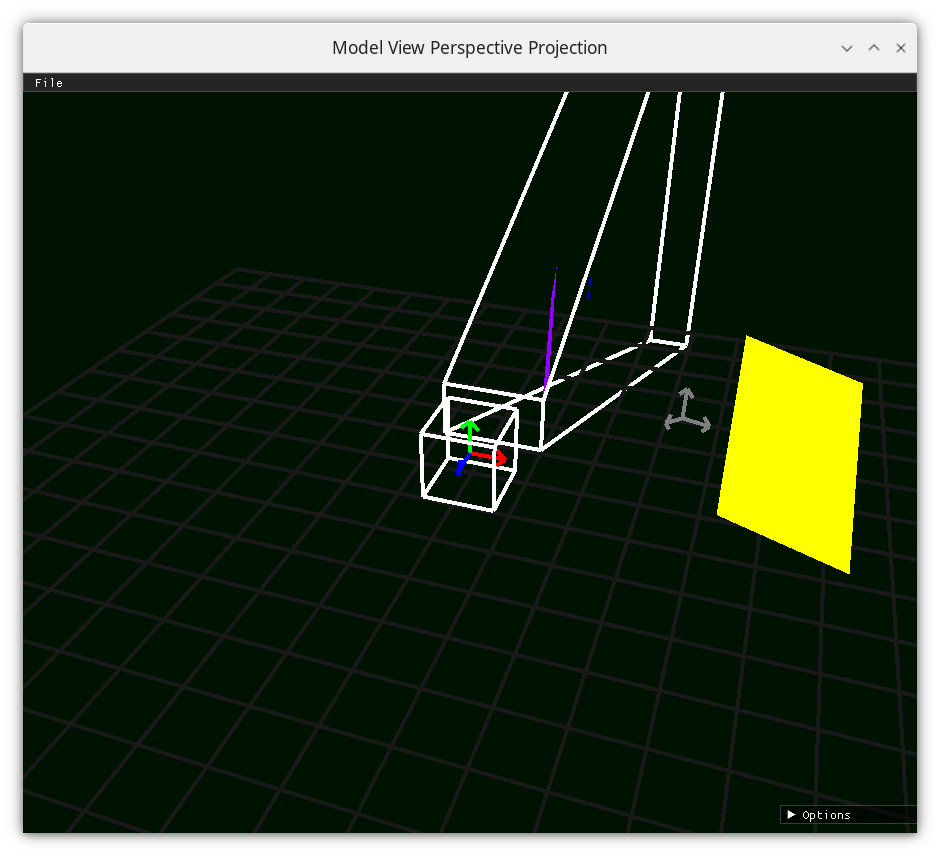
Frustum 3¶
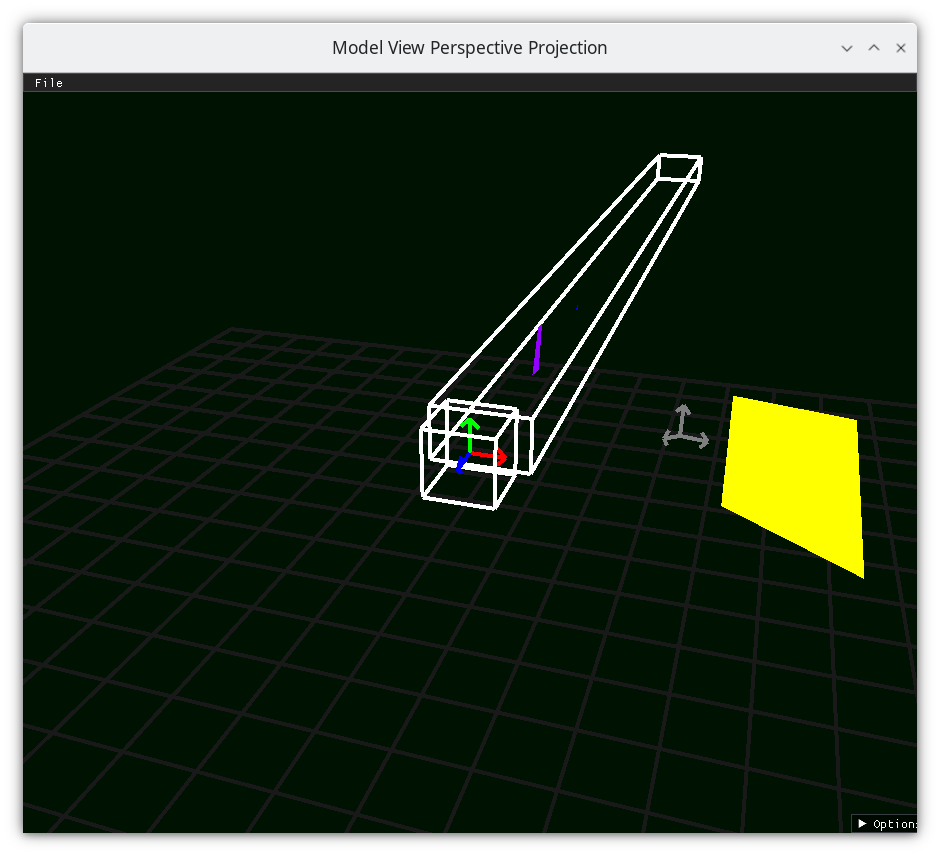
Frustum 4¶
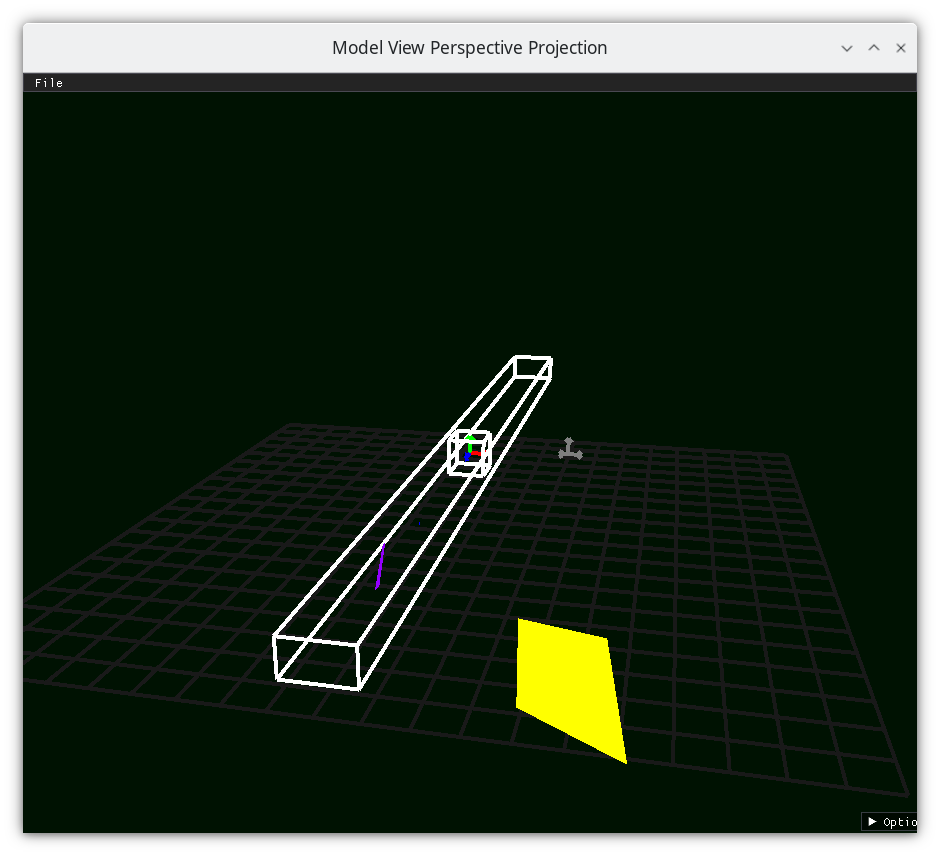
Frustum 5¶
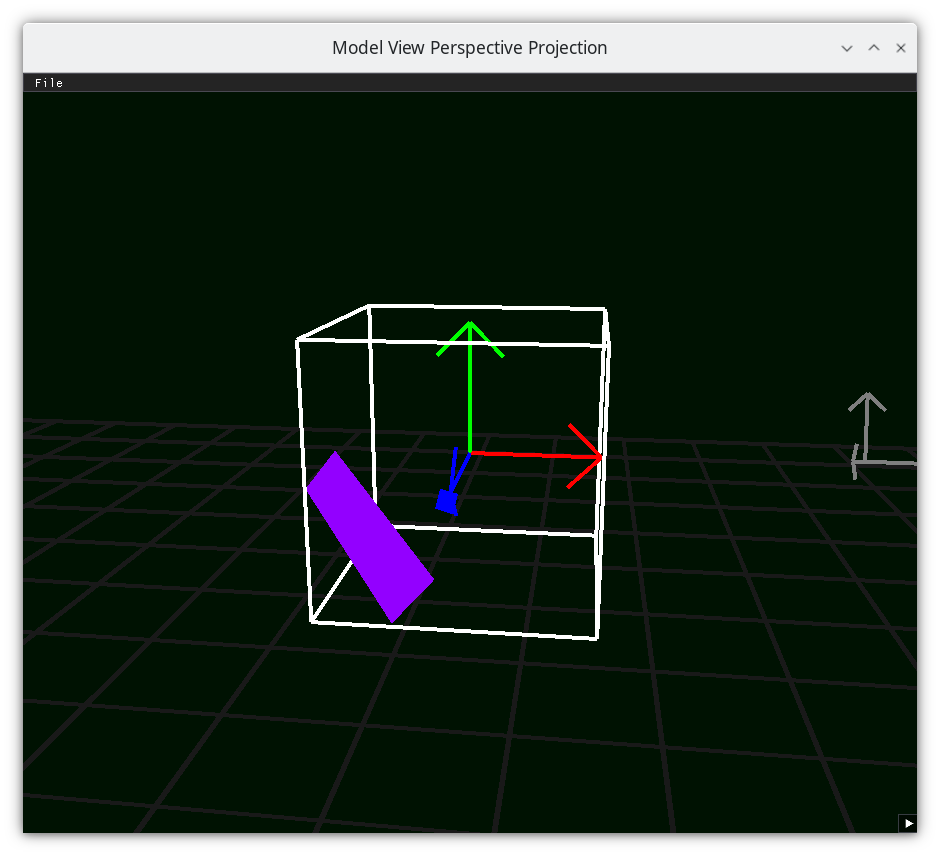
Frustum 6¶
How to Execute¶
Load src/modelviewprojection/demo18.py in Spyder and hit the play button.
Move the Paddles using the Keyboard¶
Keyboard Input |
Action |
|---|---|
w |
Move Left Paddle Up |
s |
Move Left Paddle Down |
k |
Move Right Paddle Down |
i |
Move Right Paddle Up |
d |
Increase Left Paddle’s Rotation |
a |
Decrease Left Paddle’s Rotation |
l |
Increase Right Paddle’s Rotation |
j |
Decrease Right Paddle’s Rotation |
UP |
Move the camera up, moving the objects down |
DOWN |
Move the camera down, moving the objects up |
LEFT |
Move the camera left, moving the objects right |
RIGHT |
Move the camera right, moving the objects left |
q |
Rotate the square around its center |
e |
Rotate the square around paddle 1’s center |
Description¶
------------------------------- far z
\ | /
\ | /
\ (x,z) *----|(0,z) /
\ | | /
\ | | /
\ | | /
\ | | /
\ | | /
\ | | /
\---*-------- near z
| | /
|\ | /
| \ | /
| \ | /
| \|/
-----------------*----*-(0,0)-------------------
(x,0)
If we draw a straight line between (x,z) and (0,0), we will have a right triangle with vertices (0,0), (0,z), and (x,z).
There also will be a similar right triangle with vertices (0,0), (0,nearZ), and whatever point the line above intersects the line at z=nearZ. Let’s call that point (projX, nearZ)
because right angle and tan(theta) = tan(theta)
x / z = projX / nearZ
projX = x / z * nearZ
So use projX as the transformed x value, and keep the distance z.
----------- far z
| |
| |
(x / z * nearZ,z) * | non-linear -- the transformation of x depends on its z value
| |
| |
| |
| |
| |
| |
| |
| |
------------ near z
\ | /
\ | /
\ | /
\ | /
\|/
----------------------*-(0,0)-------------------
Top calculation based off of vertical field of view
/* top
/ |
/ |
/ |
/ |
/ |
/ |
/ |
/ |
/ |
/ |
/ |
/ |
origin/ |
/ fov/2 |
z----*---------------*
|\ |-nearZ
| \ |
| \ |
x \ |
\ |
\ |
\ |
\ |
\ |
\ |
\ |
\ |
\ |
\ |
\|
Right calculation based off of Top and aspect ration
top
-------------------------------------------------------
| |
| y |
| | |
| | |
| *----x | right =
| origin | top * aspectRatio
| |
| | aspect ratio should be the viewport's
| | width/height, not necessarily the
------------------------------------------------------- window's
65@dataclasses.dataclass
66class Vector3D(mu2d.Vector2D):
67 z: float #: The z-component of the 3D Vector
...
203def perspective(
204 field_of_view: float, aspect_ratio: float, near_z: float, far_z: float
205) -> mu.InvertibleFunction:
206 # field_of_view, dataclasses.field of view, is angle of y
207 # aspect_ratio is x_width / y_width
208
209 top: float = -near_z * math.tan(math.radians(field_of_view) / 2.0)
210 right: float = top * aspect_ratio
211
212 fn = ortho(
213 left=-right,
214 right=right,
215 bottom=-top,
216 top=top,
217 near=near_z,
218 far=far_z,
219 )
220
221 def f(vector: mu.Vector) -> mu.Vector:
222 assert isinstance(vector, Vector3D)
223 s1d: mu.InvertibleFunction = mu.uniform_scale(near_z / vector.z)
224 x_component: mu.Vector = s1d(mu1d.Vector1D(x=vector.x))
225 y_component: mu.Vector = s1d(mu1d.Vector1D(x=vector.y))
226 assert isinstance(x_component, mu1d.Vector1D)
227 assert isinstance(y_component, mu1d.Vector1D)
228
229 rectangular_prism: Vector3D = Vector3D(
230 x=x_component.x, y=y_component.x, z=vector.z
231 )
232 return fn(rectangular_prism)
233
234 def f_inv(vector: mu.Vector) -> mu.Vector:
235 assert isinstance(vector, Vector3D)
236 rectangular_prism: mu.Vector = mu.inverse(fn)(vector)
237 assert isinstance(rectangular_prism, Vector3D)
238
239 inverse_s1d: mu.InvertibleFunction = mu.inverse(
240 mu.uniform_scale(near_z / vector.z)
241 )
242 x_component: mu.Vector = inverse_s1d(
243 mu1d.Vector1D(x=rectangular_prism.x)
244 )
245 y_component: mu.Vector = inverse_s1d(
246 mu1d.Vector1D(x=rectangular_prism.y)
247 )
248 assert isinstance(x_component, mu1d.Vector1D)
249 assert isinstance(y_component, mu1d.Vector1D)
250
251 return Vector3D(
252 x_component.x,
253 y_component.x,
254 rectangular_prism.z,
255 )
256
257 return mu.InvertibleFunction(f, f_inv)
202while not glfw.window_should_close(window):
...
244 # cameraspace to NDC
245 with mu3d.push_transformation(
246 mu3d.perspective(
247 field_of_view=45.0, aspect_ratio=1.0, near_z=-0.1, far_z=-1000.0
248 )
249 ):
250 # world space to camera space, which is mu3d.inverse of camera space to
251 # world space
252 with mu3d.push_transformation(
253 mu3d.inverse(
254 mu3d.compose(
255 [
256 mu3d.translate(camera.position_ws),
257 mu3d.rotate_y(camera.rot_y),
258 mu3d.rotate_x(camera.rot_x),
259 ]
260 )
261 )
262 ):
263 # paddle 1 space to world space
264 with mu3d.push_transformation(
265 mu3d.compose(
266 [
267 mu3d.translate(paddle1.position),
268 mu3d.rotate_z(paddle1.rotation),
269 ]
270 )
271 ):
272 GL.glColor3f(*iter(paddle1.color))
273 GL.glBegin(GL.GL_QUADS)
274 for p1_v_ms in paddle1.vertices:
275 paddle1_vector_ndc = mu3d.fn_stack.modelspace_to_ndc_fn()(
276 p1_v_ms
277 )
278 GL.glVertex3f(
279 paddle1_vector_ndc.x,
280 paddle1_vector_ndc.y,
281 paddle1_vector_ndc.z,
282 )
283 GL.glEnd()